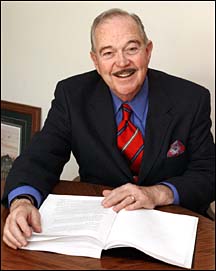|
|
|
|
|
|
INSIDE IOWA STATE May 3, 2002 Manatt mentors record number of Ph.D. students
Top sports recruiters are able to spot potential talent. Top educators possess that same keen awareness of untapped teaching ability. Take the case of Richard Manatt, university professor of educational leadership and policy studies, and Frances Kayona, one of the 175-plus Ph.D. graduates whose review committee Manatt has chaired or co-chaired in his 38-year career at Iowa State. Kayona was working as a night auditor for an Arizona hotel where Manatt stayed several times a year while conducting research. Manatt could sense that Kayona had more potential. "I kept encouraging her to come to Iowa State," Manatt said. "She was definitely underemployed. She finally took my advice, completed her master's and Ph.D. work here, and served as the program manager for our School Improvement Model program for another four years." Kayona, now an assistant professor of educational leadership and community psychology at St. Cloud State University, Minnesota, said Manatt's perseverance changed her life. And now she can make that same positive impact on future teachers and administrators. Of the 175 Ph.D. graduates, a record number in the state and among Iowa State's peer institutions, many have chosen similar paths. Forty-nine are college professors, 10 are college department chairs and one has become a university president. Many work as principals or superintendents in school districts from Iowa to Taiwan. Kayona, an American Indian, is one of 35 female and 18 ethnic minority doctoral candidates who studied with Manatt. Manatt said his philosophy for Ph.D. students was that he should be able to graduate five students every year -- two in the fall, two in the spring and one in the summer. He worked with 27 Ph.D. students in the 1960s, 53 in the 1970s and 44 in both the 80s and 90s. So far this decade, he has graduated seven Ph.D. students. Two more will graduate before Manatt retires May 15. For several decades, Manatt was in a friendly competition with economics professor Earl Heady, until Heady's death in 1987. The two would get together at each commencement to compare their graduate tallies. As creator and director of the college's School Improvement Model (SIM) program, Manatt, with research partner Shirley Stow, was able to attract significant grant funding and subsequently quality students, a key factor in his ability to work with so many Ph.D. students. School districts, foundations and the U.S. Department of Education provided grant funding that paid for the graduate students who provided on-site evaluation and training. The self-funded program enabled Manatt to offer many Ph.D. students a salary that was high enough to support a family. Ames offered an attractive community for young professionals. The SIM project helped many school districts in the country create evaluation tools for teachers, principals and superintendents. In 1973, Manatt helped introduce the then-revolutionary idea of having students provide feedback about their teachers. The West Des Moines Community School District was the test district. Manatt said the new model provided full circle evalution, from what students knew when they entered to what they had learned by the time they left. "Those experiences led to all of the research we have done. We went from norm-referenced testing to a sense of how the students were learning," he said. Manatt and his Ph.D. students also researched areas in educational management, performance appraisals and school improvements using curriculum renewal, alignment and assessment. Besides collaborating with his students, Manatt has conducted research with his wife, Jackie, a former English teacher and program manager of Iowa State's Science Bound program. The two studied international English-speaking schools in 17 countries and in dependent schools of the U.S. military. Their joint research established evaluating tools schools could use to gauge the quality of education. "These schools promise parents and U.S. corporations (who pay for many of the schools) that the education provided in host foreign countries provides the same education as a good U.S. school," Manatt said. One study showed disparity in some military dependent schools between minority students and white students. Through Manatt's research, school officials were able to address some of the inequities. Jackie Manatt created and manages a database that keeps Manatt's "extended family" of Ph.D. students connected and networked. Many of those students provided the base for a new endowment at Iowa State in Manatt's name. The endowment funds fellowships for Ph.D. students in educational administration. The fund drew strong support from the professor's alumni, and one of them, Les Omotani, superintendent of the West Des Moines school district, chaired the fund-raising drive. "These people literally are part of our family," Manatt said. "When they first come to ISU, we help them find places to live, good schools for their children and provide a social network early on. We continue that same level of commitment after they graduate." |
|
Ames, Iowa 50011, (515) 294-4111 Published by: University Relations, online@iastate.edu Copyright © 1995-2001, Iowa State University. All rights reserved. |
